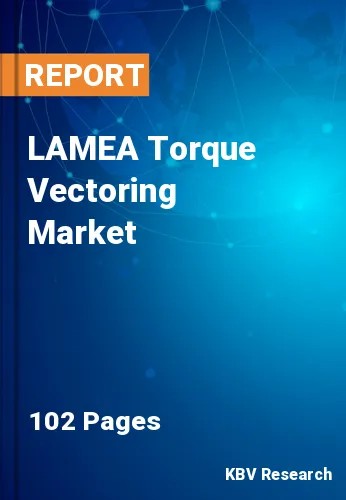The Latin America, Middle East and Africa Torque Vectoring Market would witness market growth of 18.5% CAGR during the forecast period (2022-2028).
Torque vectoring devices that deliver constant yaw moments can significantly improve the handling response of EVs. Torque vectoring systems modify the vehicle's dynamic and steady-state characteristics. The idea can help achieve improved performance, for instance, by decreasing the understeer gradient, lengthening the linear dependence of the vehicle reaction, and raising the maximum lateral acceleration.
The size of the torque vectoring market is also being driven by the increase in the usage of passenger and commercial cars across industries, particularly in logistics and transportation. The strict regulations and government partnerships to reduce carbon emissions worldwide are the main reasons propelling the demand for torque vectoring.
Various initiatives and programs are being developed by governments to promote sustainability and produce clean, green energy. At the industrial level, several incentives and subsidies are provided to encourage the transition to electric or hybrid cars. Also, regulatory organizations impose a variety of punishments to encourage the development of EV infrastructure as well as other crucial assistance for the promotion of green and clean energy.
Residents' income is not subject to income tax in Dubai. As a result, the demand for luxury goods, including cars, is thriving in the UAE. The luxury car industry is expanding strongly in the nation, whether it is due to rising consumer per capita income, excellent road conditions, or a favorable tax structure. People increasingly invest in luxury cars because of amenities like automatic safety features, integrated entertainment systems, and superior interior and exterior finishes. Hence, the rising preference for luxury vehicles and the increasing consumer disposable incomes are the primary factors boosting the development of the torque vectoring market in this region.
The Brazil market dominated the LAMEA Torque Vectoring Market by Country 2021, and would continue to be a dominant market till 2028; thereby, achieving a market value of $335.5 million by 2028. The Argentina market is estimated to grow a CAGR of 19.1% during (2022 - 2028). Additionally, The UAE market would display a CAGR of 18.2% during (2022 - 2028).
Based on Propulsion, the market is segmented into All Wheel Drive/Four Wheel Drive (AWD/4WD), Rear Wheel Drive (RWD) and Front Wheel Drive (FWD). Based on Vehicle Type, the market is segmented into Passenger Car, Light Commercial Vehicles and Heavy Commercial Vehicles. Based on Clutch Actuation Type, the market is segmented into Hydraulic Clutch and Electronic Clutch. Based on Technology, the market is segmented into Passive and Active. Based on countries, the market is segmented into Brazil, Argentina, UAE, Saudi Arabia, South Africa, Nigeria, and Rest of LAMEA.
Free Valuable Insights: The Global Torque Vectoring Market is Predict to reach $20.2 Billion by 2028, at a CAGR of 15%
The market research report covers the analysis of key stake holders of the market. Key companies profiled in the report include GKN Automotive Limited (Melrose Industries PLC), Continental AG, ZF Friedrichshafen AG, JTEKT Corporation, American Axle & Manufacturing, Inc., Univance Corporation, Dana Incorporated, BorgWarner, Inc., Eaton Corporation PLC, and Robert Bosch GmbH.
By Propulsion
By Vehicle Type
By Clutch Actuation Type
By Technology
By Country
Our team of dedicated experts can provide you with attractive expansion opportunities for your business.

